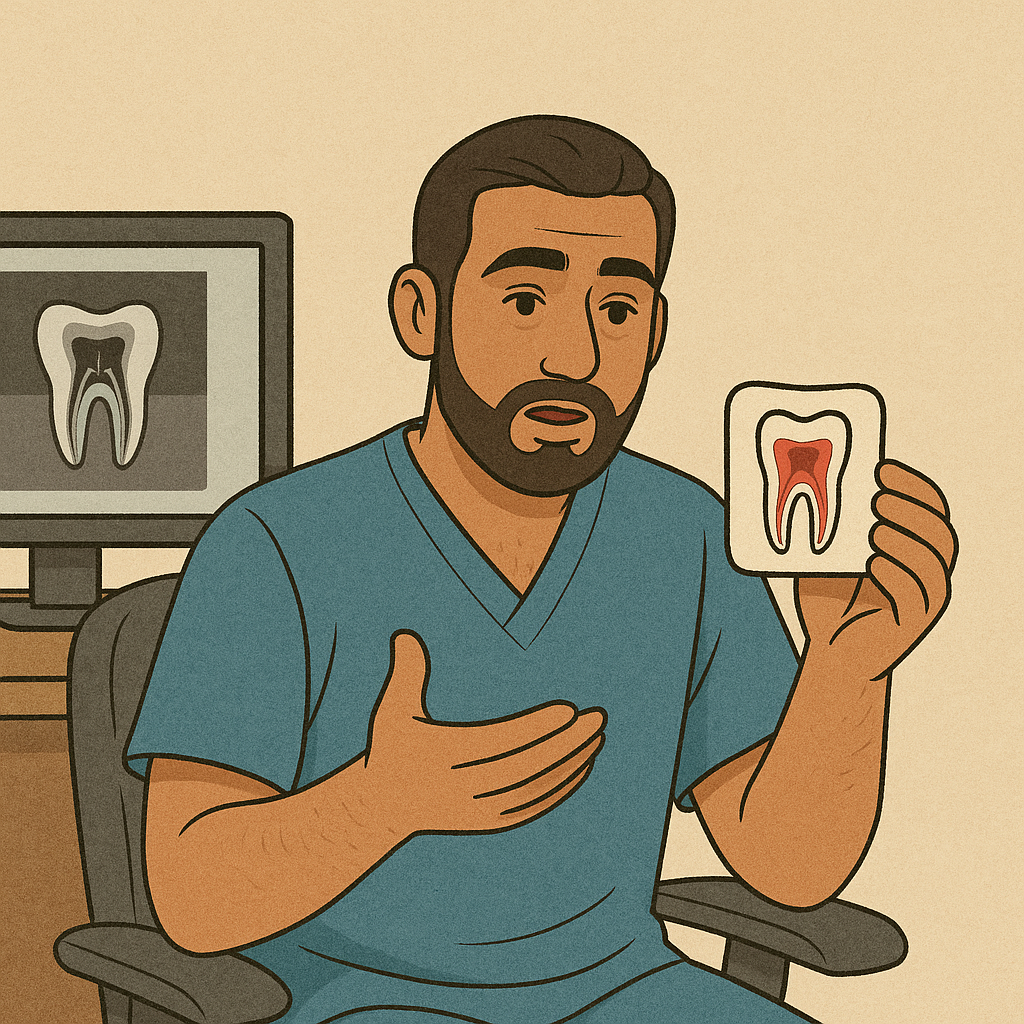Yes — to some extent. A root canal treatment involves cleaning and disinfecting the inside of the tooth where the nerve used to be. This process inevitably irritates the tissues around the root tip. As a result, mild discomfort, tenderness when biting, or even a dull ache for a few days is considered part of normal recovery.
Think of it as a bruise inside your jaw: it takes time for the surrounding tissues to heal.
Common Reasons for Tooth Pain After Root Canal
- Inflammation of the surrounding tissues
During treatment, instruments and disinfectants may slightly irritate the bone and ligaments holding the tooth. This can cause sensitivity for 3–7 days. - Overfilling or material beyond the root tip
Occasionally, sealing material or medication extends a bit past the end of the root. The body needs time to adapt, which may create temporary soreness. - Residual bacteria
Despite careful cleaning, microscopic bacteria can remain in tiny root branches. The immune system reacts to this, which may lead to temporary discomfort. - Bite adjustment
After root canal therapy and a new filling or crown, the bite may feel slightly “off.” Constant pressure on the tooth can make it sore until corrected. - Healing takes time
Just like after any surgical procedure, the body requires a healing period. Some patients are pain-free in 1–2 days, while others feel tenderness for up to two weeks.
When Should You Be Concerned?
While mild to moderate post root canal pain is common, there are warning signs that mean you should contact your dentist:
- The pain gets worse after a few days instead of better.
- You notice swelling of the gums, face, or jaw.
- There is a pulsating or throbbing pain that does not respond to over-the-counter medication.
- You develop a fever or general unwell feeling.
- The discomfort persists for several weeks without improvement.
These symptoms may indicate infection, an untreated canal, or a need for retreatment.
How to Relieve Post Root Canal Pain at Home
- Take prescribed medication exactly as your dentist recommends.
- Avoid chewing hard foods on the treated tooth for the first few days.
- Keep up with oral hygiene — gentle brushing and flossing help prevent new problems.
- Use cold compresses if there is swelling.
Most importantly, stay in touch with your dentist. At TRUE SMILE Dental Center, we schedule follow-up appointments to ensure healing is on track.
Preventing Complications After Root Canal Treatment
Successful root canal therapy depends not only on the treatment itself but also on proper restoration. A tooth that has undergone root canal treatment often becomes brittle. Covering it with a high-quality crown or onlay provides strength and long-term protection.
That is why at TRUE SMILE we don’t just stop at cleaning the canals. We create a comprehensive plan to restore both the function and appearance of your tooth, preventing reinfection and minimizing the risk of future pain.
Final Thoughts
So, why does a tooth still hurt after root canal treatment? In most cases, it is simply part of the healing process. Mild pain or tenderness for a few days is normal. But if the pain increases, lasts longer than expected, or comes with swelling, it is important to seek professional help.
At TRUE SMILE Dental Center Abu Dhabi, our specialists use advanced technology, 3D imaging, and modern materials to make root canal therapy as comfortable and effective as possible. If you are experiencing post-root canal pain or are worried about your dental health, we are here to help.




















